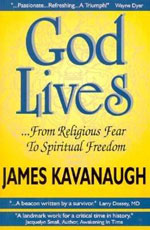James Kavanaugh died at the age of 81 on January 9, 2010. He was a former Catholic priest upset by the Church's authoritarian style and rigid interpretations of birth control, divorce, premarital sex, and celibacy for priests. Kavanaugh served as a parish priest in Lansing and Flint, Michigan before getting his doctorate at the Catholic University in Washington, D. C. His bestseller A Modern Priest Looks at His Outdated Church came out in 1967 and was called by a reviewer in The New York Times "a personal cry of anguish that goes to the heart of the troubles plaguing the Catholic church."
Kavanaugh left the Catholic Church for a career as a writer, poet, philosopher, and clinical psychologist. He spoke to large numbers of Catholics wounded by the dogmas and terrible images of God they received from orthodox priests. Among the two dozen books he wrote is God Lives . . . From Religious Fear to Spiritual Freedom, which he prefaces with a quotation from Deepak Chopra: "With willingness and trust you set out to rejoin the river of life. There is no charted course, no signposts other than those that appear in your own heart. Yet in time, the river will gather you up and sweep you along, without your knowing how, into the sea of bliss that makes all life possible."
In this blend of memoir, poetry, and spiritual questing, Kavanaugh writes cogently about the arrogance of authority, the Bible as history, the vengeful God of laws, love taboos and sexual guilt, and the myth of death and hell. What is most intriguing is the author's understanding of what's involved in spiritual transformation:
"I had not given up religion, I had only matured. Once I knelt before a statue of the Virgin Mary and poured out my heart. Now I could tell a woman that I loved her and knew that love was not the poetic affection I had imagined. Once I paid homage to the mystery of God by honoring Him in the Trinity. Now I began to feel the mystery of God's presence in men and know the pain of uncertainty, of blind and doubtful faith. Once I needed hell to tell me of man's suffering, of his inhumanity to other men. Now I felt the terror of human suffering, the horror of a life without love, the anguish of human loneliness including my own. Once I needed heaven to encourage me, to give me strength. Now I could try to face death with the little bit of meaning that I drew from every day."
Throughout the rest of the book, Kavanaugh covers his journey from myth to spiritual freedom. We were so impressed with his writing and perspective that we included the following story about one couple's relationship in our book Spiritual Literacy:
"I see the birth of God in the old Italian couple who run a grocery store in my neighborhood. They do not often speak of God or Jesus or salvation, but I know they feel the divine presence. This couple love each other and greet me with a kind word and a smile. They smile when I buy a half-pound of hamburger for some homemade chili. The store is their home, their life, their community. They know almost everyone by name, or at least, by face. They charge more than a supermarket, but they give more. And when I leave the store, I somehow feel more human, more in touch with the realities of life, more a man, closer to God. They work every day from nine till nine. They eat lunch and dinner together while they work. And when I say, 'You work too hard,' they answer, 'This is where we are the happiest.' And I believe them. They do not work at all; they spend the day serving their friends. Then they go home, have a glass of wine, and watch TV and say their simple prayers to a friendly God or light a candle to their madonna. Sometimes they play cards or reminisce. Then they go to bed. At times I sing a little when I leave their store, not because I have been 'saved,' but because in the beauty of this vision of man, I sense in my life the Living God."
